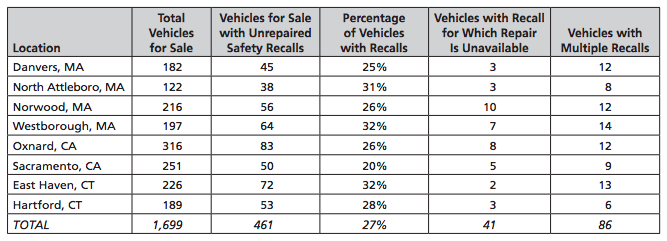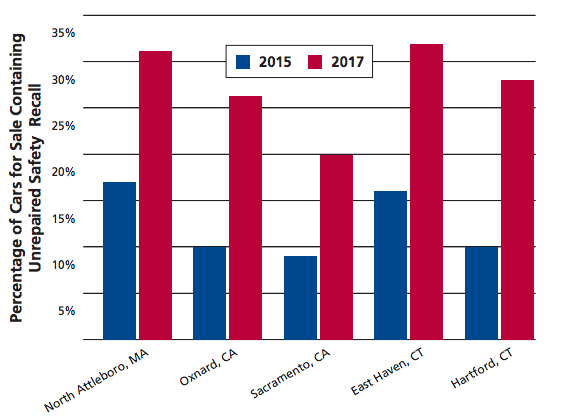27% Of Vehicles At Carmax Have An Open Safety Recall
Even though CarMax, the nation’s largest seller of used cars, has been called out publicly by safety advocates and federal regulators, a new report claims that more than 1-in-4 vehicles being sold by CarMax is currently under an open safety recall.
The Center for Auto Safety, along with Consumers for Auto Reliability and Safety (CARS) Foundation and the MASSPIRG Education Fund, recently released a report [PDF] finding that 27% of vehicles for sale at eight CarMax locations contained unrepaired safety defects.
The report — based on a survey of 1,699 vehicles that CarMax advertised for sale at eight locations in Northern and Southern California, Massachusetts, and Connecticut — found that more than one-in-four — or 461 — vehicles had open safety recalls.
The figure represents a 15% increase since the groups performed their last survey in 2015. At that time, the report looked at five CarMax dealerships, finding that 12% of the vehicles had open recalls.
Not Making Changes
Despite finding a number of unrepaired recalled vehicles at the original five dealerships in 2015, CarMax allegedly hasn’t changed its practices.
For instance, in 2015, 10% of vehicles sold a dealership in Hartford, CT, had open recalls. Fast forward to 2017 and the report found that 28% of the vehicles at the same dealership had unrepaired safety recalls.
Likewise, in 2015, a North Attleboro, MA, dealership had 17% of vehicles with open safety recalls. In 2017, that figure increased to 31% of vehicles.
The Recalls
The recalls ranged from seat belt defects, non-deployment of airbags, engine fire risks, loss of power steering while driving, faulty parking breaks, and shrapnel-shooting airbags.
At least 45 of the 1,699 vehicles surveyed contained recalled Takata airbags that have been linked to 11 deaths and hundreds of injuries in the U.S.
Of the vehicles found to have open safety recalls, 86 had more than one unrepaired safety issue. Among those vehicles, 19 had three or more open safety issues.
One GMC Sierra Light-Duty Pickup Truck for sale in Westborough was found to have six unrepaired safety recalls.
No Fixes
While CarMax advises customers to have recalls repaired immediately by the manufacturer, many of the vehicles for sale with recalls can’t be fixed.
Of the vehicles surveyed, 41 (or 9%) have an unrepaired safety recall for which no remedy is yet available.
Consumers who purchase such a vehicle may have to wait months or years before their unsafe recalled vehicle can be repaired, the groups contend.
These vehicles included a 2014 Ford Escape that was recalled over a seatbelt anchor that could break, preventing the passenger from being restrained in the event of a sudden stop. Another 2016 Mercedes GLE Class vehicle was recalled over an unintentional engine shutdown problem that could increase the risk of crash in certain traffic situations.
“It is dangerous and irresponsible for CarMax or other dealers to assume that car buyers will have time to get unsafe, defective vehicles repaired before disaster strikes,” the report states.
The group points to a June 2016 incident in which a woman purchased a 2013 Chrysler Town & Country for a different dealer. The company had not disclosed that the van had two unrepaired safety recalls. Six months later, the driver’s door caught fire without warning.
Disclosures
“CarMax is selling huge numbers of unsafe, defective recalled cars that are ticking automotive time bombs. They pose a serious threat to the safety of all American motorists and their families,” Rosemary Shahan, President of the Consumers for Auto Reliability and Safety (CARS) Foundation, said in a statement.
As with the 2015 report, the coalition notes CarMax continues to sell vehicles using the claim that it provides disclosures of safety recalls.
However, the group claims that the information CarMax provides verbally and in writing is often false, contradictory, deceptive, or misleading, or presented too late to be an effective form of disclosure.
Additionally, the new report found that sometimes the AutoCheck vehicle history reports provided by CarMax to prospective car buyers falsely indicates that there is no safety recall. This, despite the fact that the National Highway Traffic Safety Administration showed there were multiple unrepaired safety recalls.
In some cases, the groups found that CarMax didn’t inform customers of the recalls until after they had already purchased the car.
One advocate says this happened to him in 2015. While he told the associate it was important that the vehicle didn’t have a recall, he didn’t receive the disclosure form until after he had signed the purchase contract.
The CarMax disclosure noted that according to NHTSA there was an open recall, but the AutoCheck said there was no safety recall. In reality, the Jeep had three unprepared safer recalls, including catching fire, faulty breaks, and stalling issues.
But Isn’t This Illegal?
The answer to whether or not CarMax’s practices are illegal is complicated.
The groups contend that CarMax may be in violation of some state laws. For example, in Massachusetts it is illegal for a car dealer to sell a used vehicle to a consumer that is not fit to be driven on roads.
However, there is no specific federal law that gives NHTSA the authority to force dealers to fix recalled used cars before they are sold or rented.
That’s because, while it’s illegal for consumers to sell recalled microwaves, blenders, or other products, the folks at NHTSA lack the authority to actually force people to fix recalled vehicles before they are sold or rented.
Additionally, while the groups contend that CarMax is engaging in deceptive advertising by claiming that vehicles are safe when they have recalls, this practice isn’t illegal.
In fact, the Federal Trade Commission recently finalized a consent order that allows used car dealers to continue marketing their vehicles as safe even while they may have unrepaired defects.
The groups have asked a court to overturn this decision. The case is currently pending.
Want more consumer news? Visit our parent organization, Consumer Reports, for the latest on scams, recalls, and other consumer issues.



